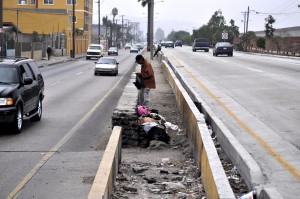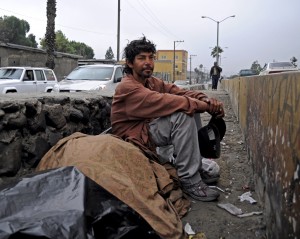I first saw Victor’s home last week when I was down in Tijuana’s Zona Norte. I was shooting photos of a mural my friends are working on at the corner of Niños Heroes and Avenida Internacional. And there it was, a mattress and a pile of personal belongings covered with a blanket, lying in a dirty median strip in the middle of the highway running west out to Pacific Ocean and the city of Playas de Tijuana.
Today I ran into Victor again and stopped to ask him if he would tell me his story.
Victor was deported two years ago, and now he has no place to live except this lonely patch of ground. He spent ten years working in the fields as a farmworker in Oxnard, picking strawberries and lemons. But he started to drink, and as he tells me, this was the source of his trouble. He got drunk one night, got into a car accident, and was deported.
Victor is one of the 300 people per day who arrive in Tijuana, after deportation from the U.S., with no place to land. 30% of these new arrivals are Mexican citizens who have lived for years, sometimes decades, in the United States, says Victor Clark Alfaro, director of the Binational Center for Human Rights in Tijuana. Because of their age—between 45-65 years old—it is nearly impossible for them to find work in Tijuana. Most have no family or connections in Tijuana, having lived most of their lives in the United States.
This is what Victor tells me. I asked him why he lives in the middle of the road, and he says he has no place else to go. Hundreds of men like him live down below in the concrete canal lining the dry river bed, hiding out in the culverts, always on the lookout for police, and for other people so desperate they will rob them to survive.
 Victor says it is more secure up in his spot in the median strip–he can keep an eye on his belongings and they don’t get stolen. On this corner, many of the residents are drug addicts and dealers, adding to the dangers of life here on the street.
Victor says it is more secure up in his spot in the median strip–he can keep an eye on his belongings and they don’t get stolen. On this corner, many of the residents are drug addicts and dealers, adding to the dangers of life here on the street.
He can’t find a full-time job–in this economy it is pretty tough. And the minimum wage for Baja California, which includes Tijuana, hardly makes it worth finding a steady job. You make about $59.82 pesos a day now, about $4.70 dollars or $141.00 dollars a month. If Victor had family here, he could live with a brother and sister-in-law and combine all their wages to make rent and utilities. In many colonias, 4 or 5 families live in one big house.
And so Victor looks around for odd jobs where he can get them. He works for about 2 hours a day at Calimax, collecting shopping carts from the parking lot and picks up 20 or 30 pesos to buy some food. All over Tijuana you see people scrambling to do what they can to make money–sweeping the street for a few pesos, selling pizza slices or fruit & vegetables in the street, singing on the bus for tips. Workers with skills in construction can make a good living here if they hustle. But the agricultural labor that Victor did in Oxnard leaves him with no real transferable skills here in urban Tijuana.
Because Victor doesn’t have any obvious tattoos, he’s had an easier time of it. Getting a job at Calimax, even for just 2 hours a day, is pretty good here, in the scheme of things. And Victor is one of the lucky ones. He doesn’t have a drug problem–not yet anyway. But many of these men fall into drug or alcohol addiction, according to Victor Clark Alfaro, or get offered lucrative contracts for $300-$500 a week by cartels to deal drugs or assist in kidnappings and murders.
It only took me a couple of hours on that corner to see the local economy in action. Men were constantly walking by, back and forth, stopping to chat and make the exchange of money for drugs.
And it doesn’t look like problems for Victor and others like him will end anytime soon. A record number of deportations have been carried out by the Obama Administration. On October 19, ICE announced another record set for the Fiscal Year that ended September 30. There were 396,906 removals in Fiscal Year 2011.
That’s a little over 1000 people a day, and many will end up in the street like Victor.


Hi Jill. You bring up a tough reality that is going on in our border region. Thanks for your help in exposing it. As an example of it that I know of (that you might be interested in documenting), right next to the Boomerang Bar in Playas, there is an abandoned building where 40-50 people are staying every night. There used to be kind of a makeshift casa migrante near by, but it’s been sort of shut down by police. It was the blue and white house on the beach. The first one along the boardwalk after the border. The lady who owns it would let people stay for free and charged very low rent if they wanted to stay longer. I think around as many as 50 people could stay there. There was some drinking going on and the cops came and now don’t let her house people there any more. Don’t know if you’re interested/able, but this guy knows a lot about what’s going on in Playas and helps deported people when he can. He has a dream of some day opening his own casa migrante in Playas. They call him “Negro.” He’s Greg’s movie. I’d be glad to introduce you some time. http://www.youtube.com/user/namtaw#p/u/2/ZVdX2N8yeu8
Hi Dan, yeah, I have wanted to meet the people in that house for a long time but I haven’t had time. And with the business boom now in Playas, and more bars, restaurants, and investment coming in, I am not surprised that the police are starting to sweep the area for migrants. To me, this is all part of the process of militarizing the border–taking power away from ordinary people who just want to help, and making cold, calculated decisions from the federal level. There’s a lot that gets lost when we don’t allow the local neighbors to take care of people and use their own judgment to decide what is dangerous and what’s ok. And don’t think we are any safer by allowing the American government or the Mexican police to decide who is who among migrants. You can see very clearly how the US government is pushing innocent people directly into a life of desperation and crime.
Extraordinary story. Well told.
Thanks, Catherine!